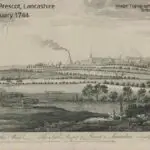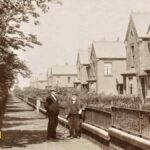Liverpool has a fascinating maritime history, and the Liverpool Docks was at the heart of its maritime industry.
The first ever commercial wet dock was completed in Liverpool on the River Mersey in 1715, and was originally known as Thomas Steer’s Dock. Over the next 200 years, more than 50 docks stretched across the seven miles from Seaforth in the north to Dingle oil terminal in the south.
In the 20th Century demand fell drastically, and most of the docks closed. By the 1980s, the area was known for its abandoned warehouses, poor quality housing and high levels of unemployment.
But the Liverpool Docks never disappeared altogether, and still retain a cargo industry together. Technology and the use of containers means only a tiny workforce is needed compared to a hundred years ago.
And regeneration did not eradicate the physical presence of all the historic docks. In fact, since 2004 the Pier Head, Royal Albert Dock and Stanley Dock conservation area have been part of the designated UNESCO World Heritage Site.
Admiral Jellicoe (1925)
In 1925, Admiral of the Fleet John Rushworth Jellicoe, 1st Earl Jellicoe, visited a number of functions in the Merseyside ports. The British commander at the naval battle of Jutland during World War I was cheered and greeted by a wide range of people.
Zeebrugge Veterans Meet (1930)
In 1930, Admiral Sir Roger Keyes hosted an event on the Mersey’s ferry boats ‘Royal Iris’ and ‘Daffodil’. Guests were naval veterans of the Zeebrugge Raid (22-23 April 1918), a daring amphibious operation to sink obsolete ships in the Belgian port’s entrance and thus prevent German vessels and U-boats leaving port.
Of the 1,700 men who took part, more than 300 were injured. Just over 200 lost their lives, including Wing Commander Frank Brock. Most of the deceased were buried near their families in England, but some were lost, and of those buried in Dover nine were unable to be identified.
British troops leaving for Sudan (1932)
In 1932, the First Battalion Coldstream Guards headed for Khartoum in the Anchor Liner Tuscania.
The second Mauretania (1939)
The original Mauretania ship became a transport and hospital ship during the First World War, but by 1935 it had ceased its transatlantic crossings and was broken up. A replacement ocean liner was launched with the same name in 1938, making its maiden voyage the following year. This luxury passenger ship owned by the Cunard White Star Line also saw active service as a transport ship during World War II, before returning to passenger service again. It was scrapped in 1965, with passenger demand waning as the aircraft industry expanded.
1940s
This footage from the Huntley Film Archives shows a wide range of settings and activities.
It starts with general views of the Liverpool Docks, before we see trains, the Langton Docks engineering works, and the elevated railway known as ‘the docker’s umbrella’.
Next, we see people walking along streets, and the Mersey Tunnel, followed by the industrial estate of Aintree and Speke and scenes from Kirby.
Later scenes show the move from slum dwellings to new estates.
Liverpool Docks Mid 1950’s
Another item held by HuntleyFilmArchives, this is a from a documentary about Liverpool shot between 1955 and 1956. It starts early in the morning with workers arriving at the port, including those using the elevated train line known as the ‘dockers umbrella’.
Next come city street scenes of shoppers and transport.
Sixties Liverpool
Archive footage of the Everton & Anfield areas of Liverpool, in the 1960s.
More footage of the Liverpool Docks in the 1960s, part of the Huntley Film Archives collection.
From the Everton area of Liverpool, probably recorded in the 1960s:
Focussing on the ferry services, this film includes shots of the Mersey, Liverpool waterfront, the Royal Liver Building, Albert Dock, Radio City Tower, and the West Waterloo Dock:
Part of the Kinolibrary Archive Film Collections, this is 1960s footage originally shot on 35mm film.
From the archives of the Kinolibrary comes this footage of Liverpool in the 1960s or early 1970s. It focuses on the Mersey Ferry operating across the Mersey River. Includes shots of teenage boys, ferry docks, and the Royal Liver Building.
Liverpool Docks (1972)
This 1972 footage is part of the British Pathé collection.
A variety of tugs, boats and ships appear, including the large ship Bunga Tanjong, and the tug Coburg. Then we see a large floating crane in operation.
The 1980s
Filmed at the Albert Dock in the early 1980s.
The Huntley Film Archives include this footage of the Liverpool Docks in the 1980s.
It opens in a shipyard, containing a small cabin cruiser. The following shots include Royal Liver Building, the Liver birds, the Liverpool Docks, the Radio City Tower, the Isle of Man Steamer, and warehouses.
In the final scenes, attention turns to the nearby waste ground and poor quality housing.
This film from the Huntley Film Archives looks at the Liverpool Docks area in the 1980s as change was in progress.
It opens with the derelict and abandoned warehouses, before visiting a building site.
Later scenes visit the Mersey, including a dredging project in progress.
More 1980s footage from the Huntley Film Archives, once again visiting a building site and then moving on to the dredging of the River Mersey.
Other Pages Created About Merseyside:
- Old Images of Merseyside
- Old Images of Wallesley
- Old Images of Teubrook, Liverpool
- Old Images of Toxteth, Liverpool
- Old Images of St Helens
1954 Royal Visit To Wigan, St Helens, Liverpool
The BBC also wrote an excellent article about the history and future of the Liverpool Docks which is worth reading.





